According to a study by OKR Mentors, nearly 50%
of the Fortune 500 companies currently utilize OKRs (Objectives and Key Results), and 70% of those companies align them with their business strategy.
With OKRs forming a critical part of the operational framework in most companies, organizations are constantly looking for scalable solutions to level up their business strategies.
More importantly, when created and managed correctly, OKRs can improve employee performance by 20% and elevate employee retention rates by 15%. As a result, organizations can implement frequent feedback cycles and establish clearer alignment between goals and their strategies.
With that in mind, let us first establish the connection between OKRs and their role in capturing and transferring knowledge within organizations.
How OKRs Can Contribute to KM Success?
OKRs can help organizations — whether they are startups or enterprises — ensure that each employee is aligned and accountable for work that is impactful and contributes to the overall knowledge strategy and business strategy.
No wonder, more than 80% companies now prefer to employ OKR coaches and mentors who can help them drive knowledge sharing and best practices with the help of OKRs.
By opting for AI and tech-enabled OKR tools over spreadsheets, you can provide real-time feedback, progress tracking, reminders, and streamline documentation and knowledge-sharing. With the help of AI-powered features, you can leverage weekly check-ins, shared dashboards, and collaborative notes to empower your knowledge management process.
7 Top OKR Tools You Must Consider For Knowledge Capture & Transfer
Now that we have understood how OKRs contribute to knowledge sharing and management, let us explore the top OKR tools that can help you align your OKRs with your knowledge capture and transfer process.
#1 OKRs Tool
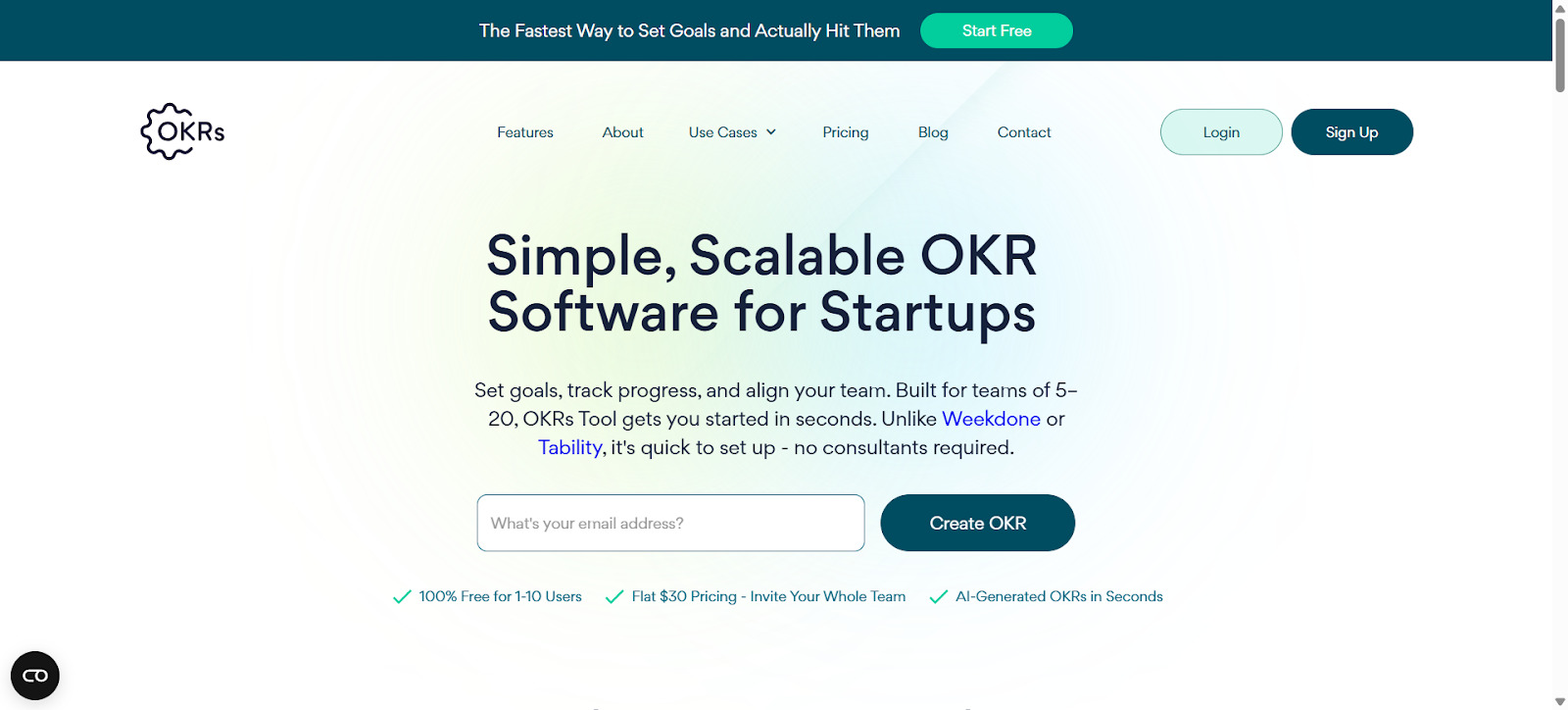
OKRs Tool is a fairly straightforward, lightweight, and AI-powered platform that empowers organizations and team leaders to enable team alignment and conduct hassle-free tracking of goals. The easy-to-use interface and dashboards make it easier for even novice users to add, track, and manage their OKRs effectively.
Documentation and Collaboration Features for KM
- Generate and recommend tailored objectives and goals with AI-powered features
- Integrate Slack updates and weekly check-ins seamlessly to facilitate knowledge sharing
- Access progress dashboards that give you real-time insights into your OKRs and highlight contributions by individual employees and teams
- Prioritizes clarity, making capturing, transferring, and sharing knowledge easier
Best for: Early-stage startups, companies, and scaling teams that want to balance speed and affordability for OKR tracking and knowledge management.
#2 Weekdone
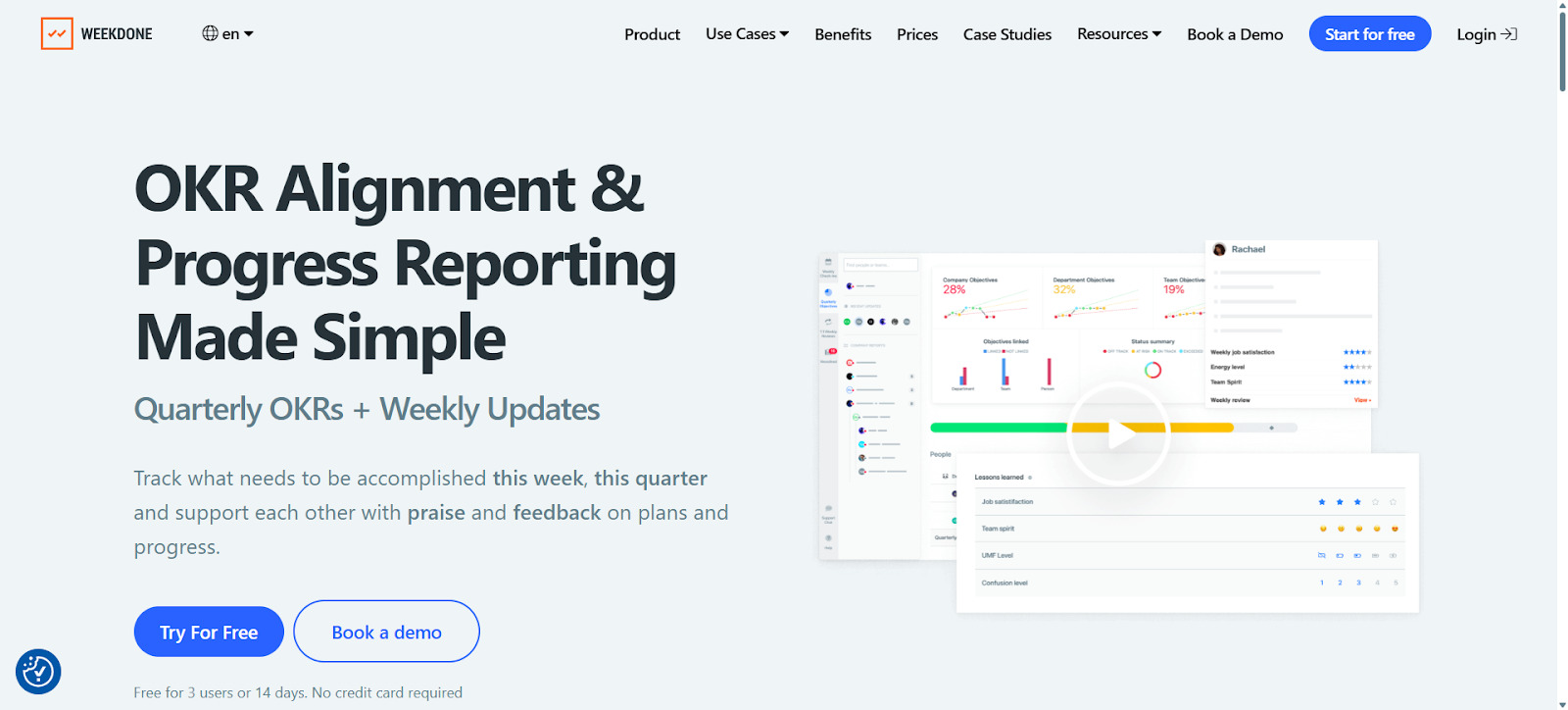
If you are looking for a tool to help manage your weekly tasks, lists, and deliverables while ensuring alignment with OKRs, Weekdone is a great option. Combining weekly reporting and OKR management within a simple interface, Weekdone is popular among small teams seeking a tool that facilitates regular team alignment and feedback.
Documentation and Collaboration Features for KM
- Offers features that boost visibility and tracking of goals and OKRs with visual dashboards
- Get insights about your OKR progress with engagement stats and pinpoint the major contributors and necessary knowledge areas
- Supports remote and hybrid teams by offering features for asynchronous sharing
Best for: Startups and small businesses that require visual progress tracking and structured check-ins.
#3 Mooncamp

Looking to develop a culture centered around people and ideal outcomes? Mooncamp can help you achieve that easily by aligning OKRs with your weekly tasks and strategies, using a beautiful and intuitive platform. With Mooncamp, you can visualize your goals, OKRs aligned with knowledge management, and KPIs, and organize them in a framework that works with your needs.
Documentation and Collaboration Features for KM
- Create easy-to-track goals with drag and drop OKRS, and create real-time progress maps to maximize overall performance
- Visualize your overall strategy with an aesthetically pleasing and comprehensive dashboard
- Align OKRs between different teams in your company to maximize knowledge transfer and ensure it is directly related to business outcomes
Best for: Small and mid-sized teams looking to implement transparent and goal-driven collaborations.
#4 Perdoo
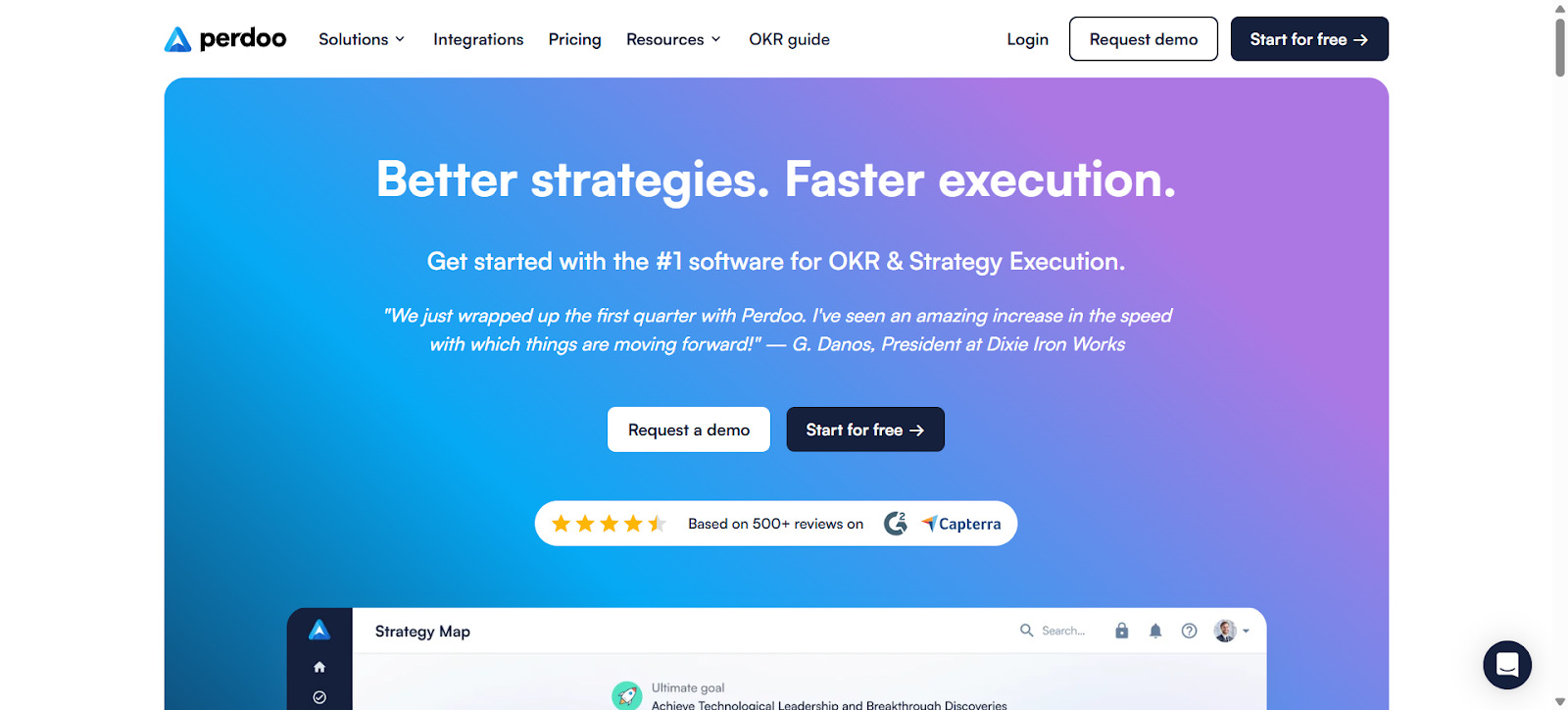
Perdoo is an OKR-tracking platform that merges OKR management with broader performance, helping teams link strategic goals with operational results. As a result, your teams and individuals will have more clarity on the most crucial goals and KPIs.
Documentation and Collaboration Features for KM
- Seamlessly integrate OKRs with KPIs to get complete visibility and clarity across projects and strategies
- Features that let you appreciate and share real-time feedback with your team members, so that you can foster better team engagement and document achievements
- Create strategy maps that can easily visualize hierarchical relationships and dependencies
Best for: Growing organizations that are looking for robust performance tracking and strategic alignment features.
#5 Tability
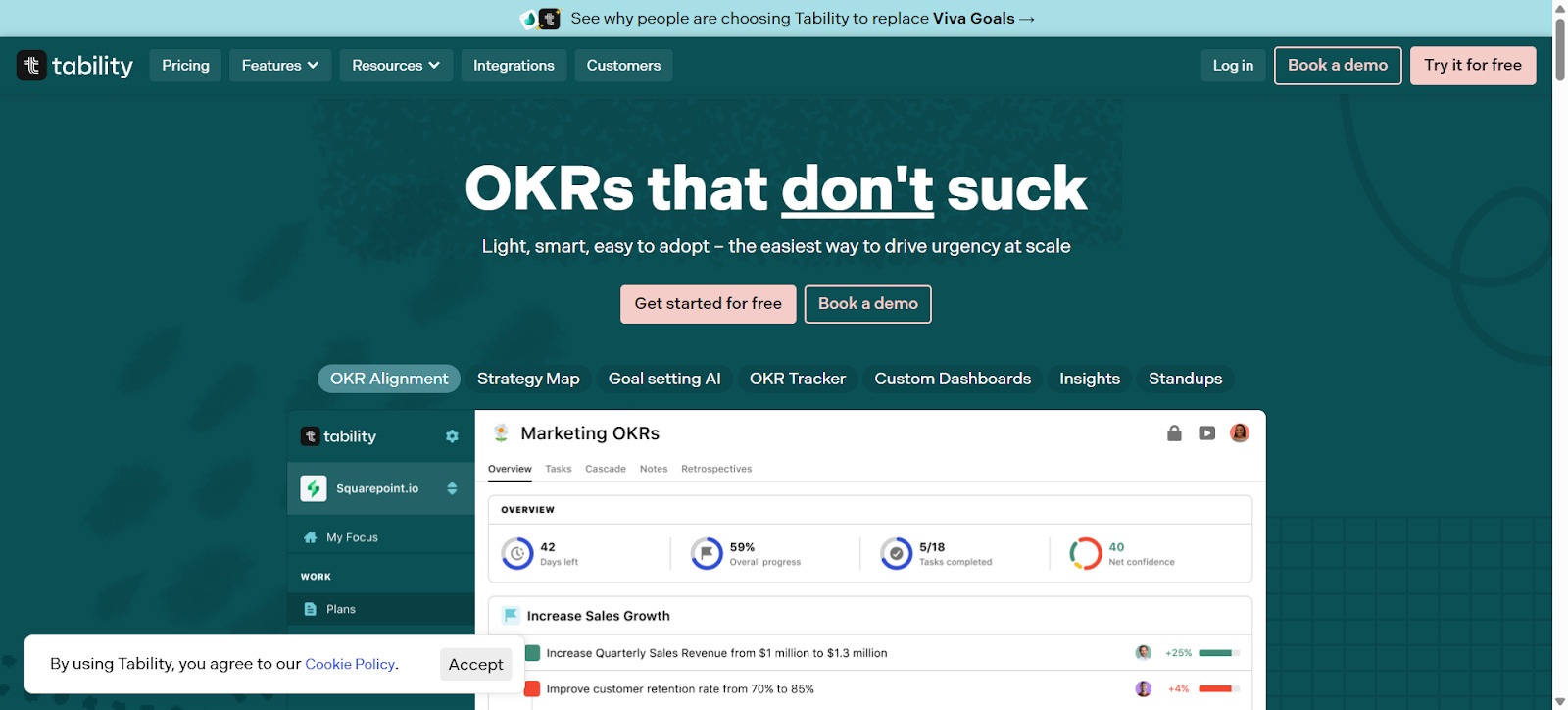
Tability can help you track OKRs easily by offering real-time progress maps and seamless onboarding. The platform can also help you get deeper insights into your performance while automating most parts of OKR management, thanks to AI-powered features.
Documentation and Collaboration Features for KM
- Automate weekly check-ins and reminders, and collaborative reminders to empower powerful collaborations within the team
- Create customizable goal templates and visuals that help you get deeper insights into your real-time performance
- Generate clear and visual dashboards that can help you share project progress and updates more easily, enabling knowledge transfer
Best for: Teams and startups that are growing rapidly and want to balance speed and streamlined knowledge workflows.
#6 Peoplebox
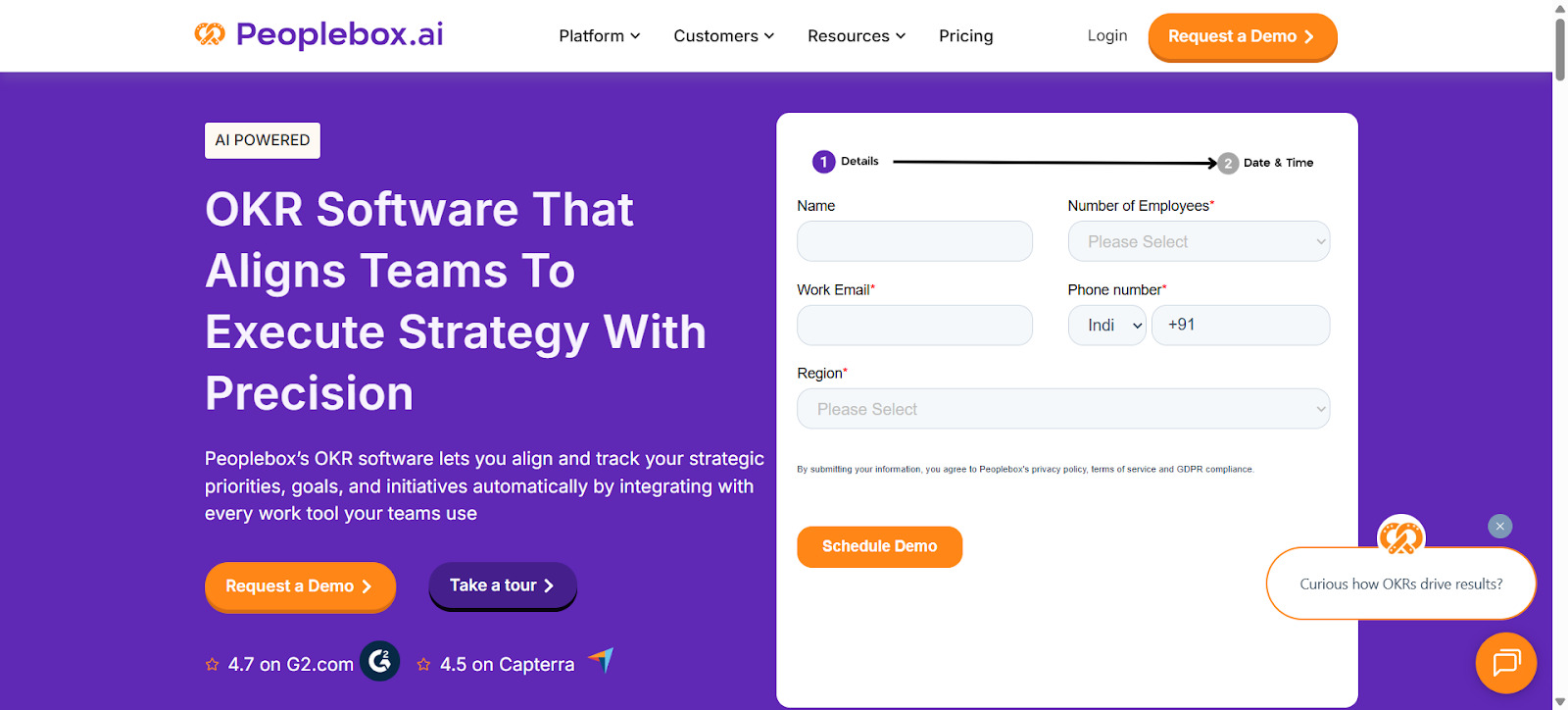
If you want a single platform that can handle all your people management, performance management, and OKR management processes, Peoplebox is a great tool to consider. With a user-friendly module to manage your OKRs, you can closely integrate knowledge sharing with overall team communication and feedback.
Documentation and Collaboration Features for KM
- Access real-time dashboards, automated reminders, and goal alignment features to simplify knowledge capturing and boost accountability
- Get support for collaborative documentation to manage the sharing and transfer of knowledge more easily
- Enable transparent outcome sharing with appropriate access controls so that all employees get a clear view of the overall performance and OKRs
Best for: Teams that value broader integration and faster adoption cycles for streamlining knowledge management
#7 Workboard
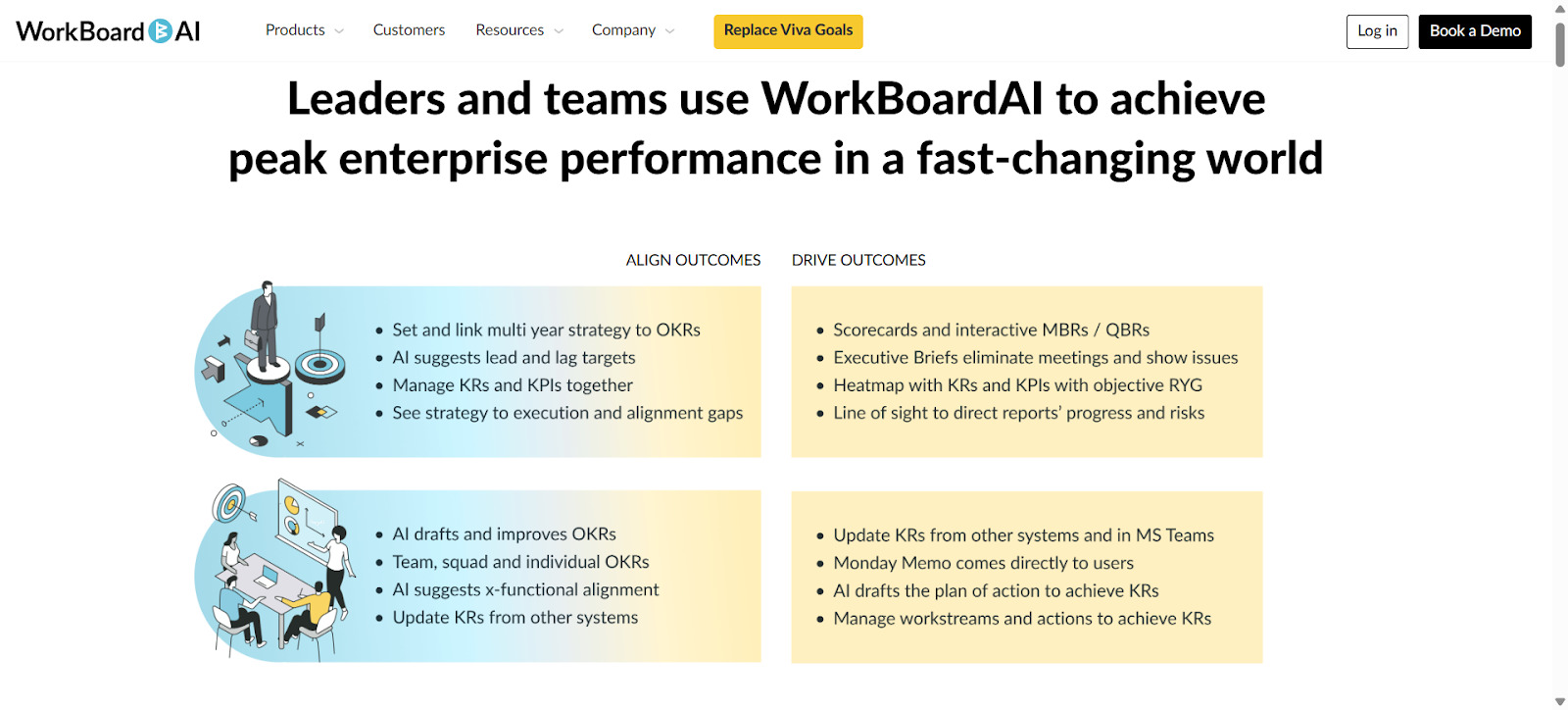
Workboard AI can help you map objectives and OKRs to specific tasks in your core processes, so that you can align and drive strong outcomes. With the help of scorecards, AI drafts, and functional alignment, you can update knowledge areas like never before and get better visibility into your overall business performance.
Documentation and Collaboration Features for KM
- Track all your documentation and feedback cycles so that you can exchange and share knowledge more easily
- Access performance dashboards with visuals and real-time insights so that you get better visibility into your goals and objectives
- Design your system to identify bottlenecks more easily, and enable cross-functional knowledge sharing and management
Best for: Organizations wanting access to enterprise-grade analytics that connect to knowledge documentation and insights.
Concluding Remarks
OKRs have been known to be helpful to organizations that want to navigate their business strategies and performance with transparency and clarity. Invest in a robust OKR tool that will help you achieve your goals while aiding you with knowledge capture and transfer. By choosing solutions that offer features to boost documentation and collaboration within the team, you can foster a culture of transparency, recognition, and continuous learning without having to worry about anything else.
___________________________





.png)
.png)
.png)
.png)